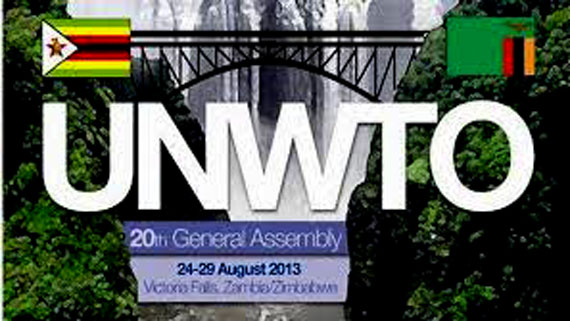
The United Nations World Tourism Organisation 20th session General Assembly which ended in Victoria Falls and Livingstone respectively has come and gone, and it is time to count the profits and/or losses.
No doubt the UNWTO constituted an important milestone in the economic history of Zimbabwe and Zambia, and of course the Southern African Development Community region. We all expect the event to leave an indelible mark on our memories, and that it be part of our generational legacy, marking a clear turning point in the tourism fortunes of especially Zimbabwe, the region and indeed the continent.
It was indeed an unprecedented show of cooperation between the co-host countries to set aside their border formalities in order to facilitate what became arguably the world’s first borderless travel and tourism convention.
The co-hosting of the tourism conference was a clear testimony of the two neighbouring States’ commitment to exploiting the regional potential of the tourism sector. It is hoped that other regions of Africa that have not done so in the past could host similar events in future in accordance with the principle of rotation and collective ownership of the UNWTO by member countries.
A Unesco World Heritage site, the Victoria Falls, is one of the world’s most astounding tourism hotspots. The Zimbabwe-Zambia border cuts right through the 108-meter deep gorge, shared by two national parks – the Mosi-Oa-Tunya National Park on the Zambian side and the Victoria Falls Park in Zimbabwe.
Arguably, selecting this as the best place to host the UNWTO was designed to send a clear message about the future of tourism in Zimbabwe in particular and Africa in general. The strategy worked. The first General Assembly ever hosted in Southern Africa generated the largest turnout in UNWTO history, with more than 700 delegates from 112 countries. It was also only the second time the assembly convened in Africa after Senegal hosted the 16th session in 2005.
In most cases, everything went off well. However, there were glitches. It appeared some delegates turned up to find they had no accommodation. Shuttle services between the dotted hotels in the resort town were confusing on the first two days when attendance was at its peak, but gradually improved.
The opening ceremony speeches and entertainment ran nearly two hours over time, delaying the dinner and leading to agitated delegates standing in long queues when the buffet opened. A number of complimentary tours and technical visits were abruptly rescheduled without proper notice, leaving several delegates furious.
- Chamisa under fire over US$120K donation
- Mavhunga puts DeMbare into Chibuku quarterfinals
- Pension funds bet on Cabora Bassa oilfields
- Councils defy govt fire tender directive
Keep Reading
The two overarching subjects of discussion were visa facilitation and boosting air-connectivity. A closed-door ministerial roundtable focused entirely on how to deal with visa issues. In turn, the plenary sessions focused on the theme of air-connectivity. Both allowed an open exchange of ideas that will provide valuable feedstock for tourism ministers to pressure their respective immigration and aviation authorities to further loosen chokeholds and facilitate free movement of peoples.
Zimbabwe Tourism Authority chief Karikoga Kaseke opened up in a manner that indicated their expectations were not necessarily met. The expected 5 000 delegates turned out to be 700. WOW! The tourism players who exhibited their wares were left counting their losses as they did not realise much business as they expected.
They forgot that the event was not an exhibition or trade fair.
Usually, UN conferences are not expositions as the local stakeholders who had perhaps borrowed money from their banks thought they would use the event to sell their wares at the UNWTO. Obviously they were disappointed when this did not happen. In fact, the big winner was politics and not necessarily businesses. Therefore, the Hospitality Industry ministry should see how it can help the local stakeholders to offset their debt.
The UNWTO came against the backdrop of a huge rush into Africa by China, India, Europe, the United States and Japan. Billions of dollars are set to pour into the continent as part of efforts to tap its natural resources, grow the purchasing power of its emerging population and influence its international relations and geopolitical policies.
For us, tourism should be a major opportunity to reduce dependence on mining or agriculture. Our economic fortunes fluctuate with the rise and fall of global prices of natural resources. Yet, tourism thrives off potentially infinite natural and cultural resources, if preserved carefully. To show that the UNWTO was an important conference where other arms of government could benefit from its spin-offs, the Ministry of Economic Planning and Investment Promotion launched a handbook to promote resorts, convention facilities, conservation areas, sustainable community-based enterprises and service suppliers.
Comparatively, Zimbabwe’s gold and diamond resources make it a richer country, but the added cash flow from tourism is much more effective at permeating through to the grassroots.
We hope that the two countries are keen to expedite tourism’s role in creating jobs, community development, investment and export earnings in Africa.











